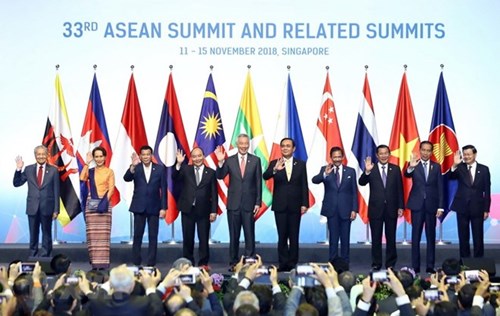Addressing other ASEAN leaders, he appreciated the achievements ASEAN has made under the chairmanship of Singapore and thanked Singaporean PM Lee Hsien Loong for his contributions.
He stressed that basing on what have been obtained in 2018, ASEAN’s resilience and innovation must continue to be promoted in the coming years.
    |
 |
|
Prime Minister Nguyen Xuan Phuc (4th from left) and other ASEAN leaders at the 33rd ASEAN Summit in Singapore |
The Vietnamese Government leader also urged ASEAN members to deepen cooperation and expand dialogues to build trust, uphold international law, support a rule-based international multilateral system, and enhance cooperation in innovation areas to optimize opportunities in the Fourth Industrial Revolution and bring the most practical benefits to their people.
PM Phuc shared Vietnam’s initiatives on a regional digital platform, a cross-ASEAN mobile network, an ASEAN technology university and a regional disaster alert system.
During his speech, the Vietnamese leader called the recent developments in the East Sea a grave concern for countries in the region as unilateral moves could lead to heightened risk of confrontation.
He emphasized the principles agreed upon by ASEAN, which involve respecting international law, especially the 1982 United Nations Convention on the Law of the Sea (UNCLOS), in the peaceful settlement of disputes, exercising self-restraint, not using or threatening to use force, not militarizing or complicating the situation, enhancing the building of trust, developing an effective and substantive code of conduct (COC), and fully and seriously implement the Declaration on the Conduct of Parties in the East Sea (DOC).
PM Phuc also voiced his support for ASEAN playing an active role in helping Myanmar address humanitarian issues in Rakhine State, as well as for efforts to promote peace, stability and denuclearization in the Korean Peninsula.
At the session, PM Lee Hsien Loong pointed out important issues that ASEAN need to focus on: building a peaceful, stable and rule-based region, sustaining the economic dynamism of ASEAN, and strengthening the bloc’s capacity to effectively ensure regional security and stability.
He noted that ASEAN has been making progress in dialogue and cooperation to address those issues.
Lee also highlighted the strides in the talks on the COC between ASEAN and China. However, he also said the East Sea situation remains complex, urging unanimity in the bloc’s common stance and adherence to the agreed principles in bolstering trust and preventing risks of instability.
Other regional leaders shared the view that under Singapore’s chairmanship tagline of “Resilient and Innovative” in 2018, the bloc has continued to firmly hold its central role and improve ASEAN-led dialogue and cooperation mechanisms, thus contributing to regional peace and stability and attaining positive outcomes in building the ASEAN Community.
They also noted the challenges posed by both complex global and regional changes and issues within the bloc itself.
They reiterated the foremost requirement for ASEAN’s unity and centrality, along with an open, transparent and rule-based cooperation architecture in the region with ASEAN at the center.
Member countries agreed that ASEAN needs to make efforts to facilitate dialogue, cooperation and trust building, including fruitful negotiations on the COC, peaceful settlement of disputes on the basis of international and the 1982 UNCLOS, and full and effective implementation of the DOC.
They also promised continued support for Myanmar to seek long-term and sustainable solutions to humanitarian issues in Rakhine State, while applauding the recent progress in the Korean Peninsula and expressing support for efforts to promote peace, stability and denuclearization in this peninsula.
At the end of the meeting, ASEAN leaders pledged their support for Thailand, who will hold the grouping’s chairmanship for 2019.
Source: VNA